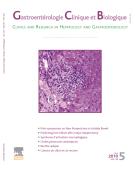Dépistage du carcinome hépatocellulaire dans une cohorte de malades porteurs d'une cirrhose d'origine principalement alcoolique - 29/02/08
Jean Henrion [1],
Ernest Libon [2],
Stéphane De Maeght [1],
Pierre Deltenre [1],
Michaël Schapira [1],
Jean-Michel Ghilain [1],
Jean-Marc Maisin [1],
Francis R. Heller [3]
Mostrare le affiliazioniScreening for hepatocarcinoma in a cohort with cirrhosis mainly of alcoholic origin |
Objectives |
To assess the feasibility and efficiency of the screening for hepatocarcinoma in a cohort of cirrhoseis mainly of alcoholic origin.
Patients and methods |
293 patients with cirrhosis, among them 186 (63.5%) from alcoholic origin, were included in a surveillance programme for hepatocarcinoma by carrying out liver ultrasonography and α-foetoprotein dosage every 6 months. Results were analyzed with a mean follow-up of 60 months. Seventeen hepatocarcinoma discovered through the surveillance programme (“screened HCC”) were compared with 40 hepatocarcinoma discovered outside the surveillance programme during the same period (“incidental HCC”).
Results |
The alcoholic origin of the cirrhosis was a predictive factor of poor compliance to the surveillance programme. Among the 186 patients with alcoholic cirrhosis, 129 (69%) were lost during the surveillance programme due to lack of compliance (97 cases) or death (32 cases). By comparison, among the 65 patients with hepatitis C-related cirrhosis, 18 were lost by lack of compliance (11 cases) or death (7 cases) (P < 0.001). Moreover, sustained or relapsing alcohol abuse after inclusion in the surveillance programme were also related to the quality of the compliance. Seventeen hepatocarcinoma were discovered through the surveillance giving an annual incidence of 2% for the emergence of hepatocarcinoma. The comparison between screened (n = 17) and incidental (n = 40) hepatocarcinoma showed that screened HCC were more often asymptomatic (P < 0.01), were more often a solitary nodule less than 5 cms (P < 0.001) and underwent more often curative treatment (P = 0.02). However, the survival between screened and incidental hepatocarcinoma was not different.
Conclusions |
Screening for hepatocarcinoma in patients with alcoholic cirrhosis is a difficult task due to poor compliance and early death. According to our results, a surveillance every 6 months is sufficient to detect early lesions accessible to curative treatment by surgical resection or transcutaneous ablation.
Mappa
© 2003 Elsevier Masson SAS. Tous droits réservés.
Vol 27 - N° 5
P. 534-539 - Maggio 2003 Ritorno al numeroBenvenuto su EM|consulte, il riferimento dei professionisti della salute.

